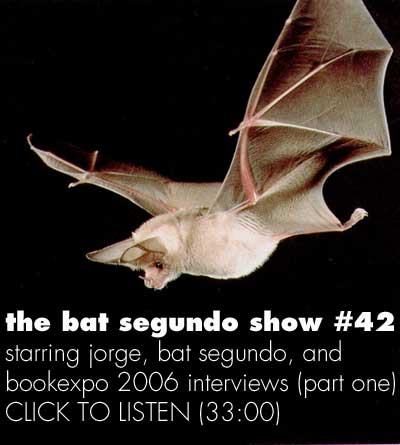- As everyone knows, the writers-to-general population ratio in Brooklyn is considerably higher than, say, the affluent liberal-to-general population ratio of Ross, California. Thankfully, publishing houses are picking up the slack.
- Sarah has the goods on the Dagger nominees.
- It’s an utter mystery why DC Comics didn’t explore this possibility years ago.
- Chick lit. Lad lit. Chica lit.
- This week in David Mitchell interviews: Arthur Salm. (See also Callie’s continuing series.)
- The infamous Bob Hoover talks with Richard Ford and gets very little outside of “It’s a big book, it’s an ambitious book and it’s also the last book I’m going to write about Frank Bascombe, so I want it to be as good as I can get it.” Thanks, Bob, for firing off those hardballs! See you in the batting cages after our game of mini golf!
- The Age contemplates Beckett.
- Canadian writer Charlotte Gill has won the $10,000 Danuta Gleed Literary Prize for Ladykiller.
- The Companion to British History took 30 years to write, killed at least sixteen people, cost well over four million pounds, was responsible for that New Coke idea, has permitted Brett Ratner to find work, is responsible for the abject hot dog to hot dog buns packaging shortfall, has caused several Jack Russell terriers to be sacrificed to an unspecified volcano god, and is known to cause blindness.
- Ginsberg’s “Howl”: fifty years later.
- Beth Orton wants to write books. (via LHB)
- Details on the new Mountain Goats album.
- Yo, New Yorker, blog articles are so six years ago.
- And can we declare a moratorium on recognizing Katie Couric? You’d think that Couric was either a conversational genius or a former Senator, given MSNBC’s ridiculous spread.
Month / May 2006
Television Week
A quick reminder to all that, this week, it’s Television week (and I refer not to that ignoble, phosphor-flickering box you have sitting in the corner threatening to abscond with your time, but the novel by Jean-Phillipe Toussaint) over at the LBC. On this end, a podcast featuring translator Jordan Stump will be posted on Friday that you really won’t want to miss — particularly if you’re interested in the current state of translators in the publishing industry.
The Bat Segundo Show #42
Guests: Carolyn Kellogg, Steve Saladino, Megan Sullivan, Amanda Darling, Kassia Kroszer, Kirk Biglione, Ron Hogan, Brian Murray, Michelle Wildgen, Mike Webster, Joseph Wortenva, Laurel Snyder and Delia Falconer.
Condition of Mr. Segundo: Believing he may have hit the worst point in his life.
Subjects Discussed: Dubious podcasting panels, marketing terminology, fisting, Tyler Cowen’s essay, bookstore websites, the “hit or miss” quality of BEA panels, whether or not “the long tail” is a great conspiracy theory, “the future is aluminum,” the relevancy of Wired, death, promoting a book without a publishing deal, the Tin House imprint’s break with Bloomsbury, playing chess vs. promoting books, a brief moment involving a Sousaphone, how to create exuberance without Richard Nash, the difficulties of shopping around a literary anthology, and shopping an Australian novel around in New York.
Listen: Play in new window | Download
Adolescent Audio Experiments #1
Someone Tell Stallone It’s Not 1985 Anymore
Bad enough that we’re seeing the return of Rocky Balboa. But Rambo IV? I remain curious: who exactly is Stallone’s core audience these days? Perhaps Hollywood should pay attention to the numbers:
Get Carter (2000). Budget: $40M, Domestic Gross: $14.9M.
Driven (2001). Budget: $72M, Domestic Gross: $32.6M.
D-Tox (2002). Budget: $55M, Opening Weekend: $32,300.
Shade (2003). Budget: $6.8M, Domestic Gross: $25,032.
And those are four of the last five films featuring Stallone in the star role. (The IMDB has scant BO biz on Avenging Angelo.) In other words, it is quite clear that Stallone isn’t a profitable star anymore. Or does Hollywood work on the assumption that Stallone co-hosting The Contender translates into instant revenue down the line? Or do they really believe that audiences will flock to Rocky Balboa at 1990 levels? Of course, since Stallone has kept the budget for Rocky Balboa at $24 million, perhaps this is the secret ingredient to his cinematic return. Unless he’s still huge in Europe.

